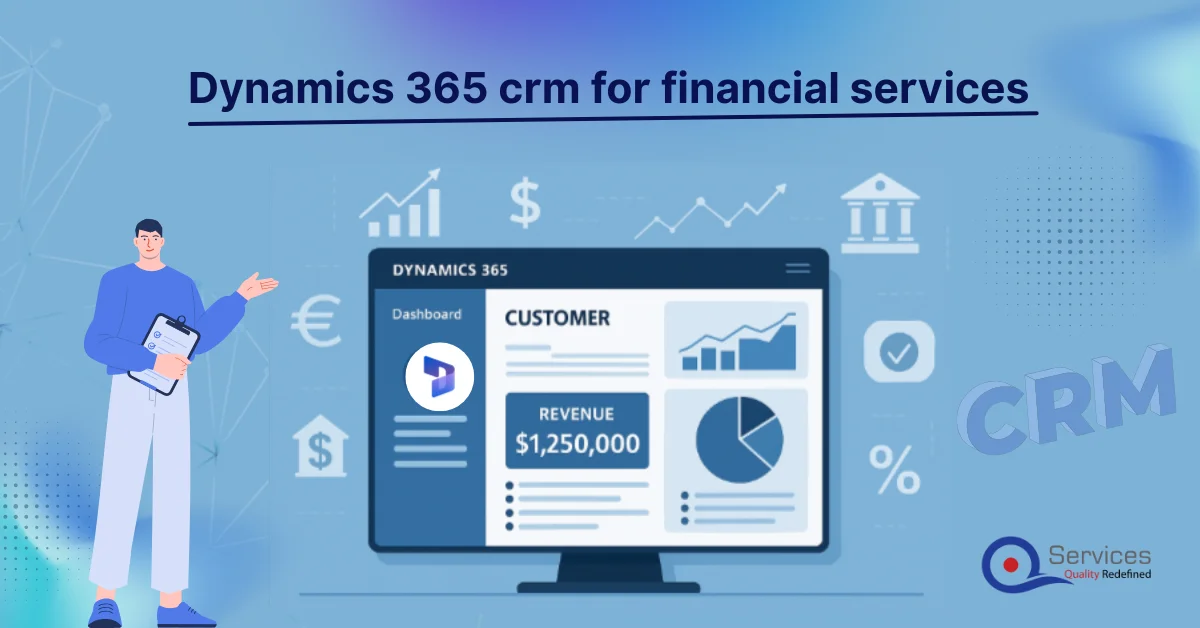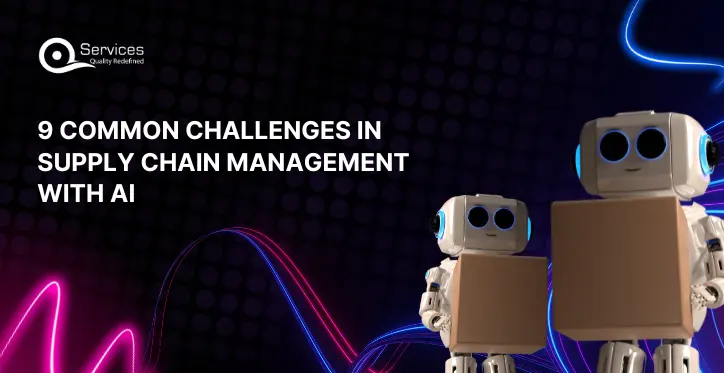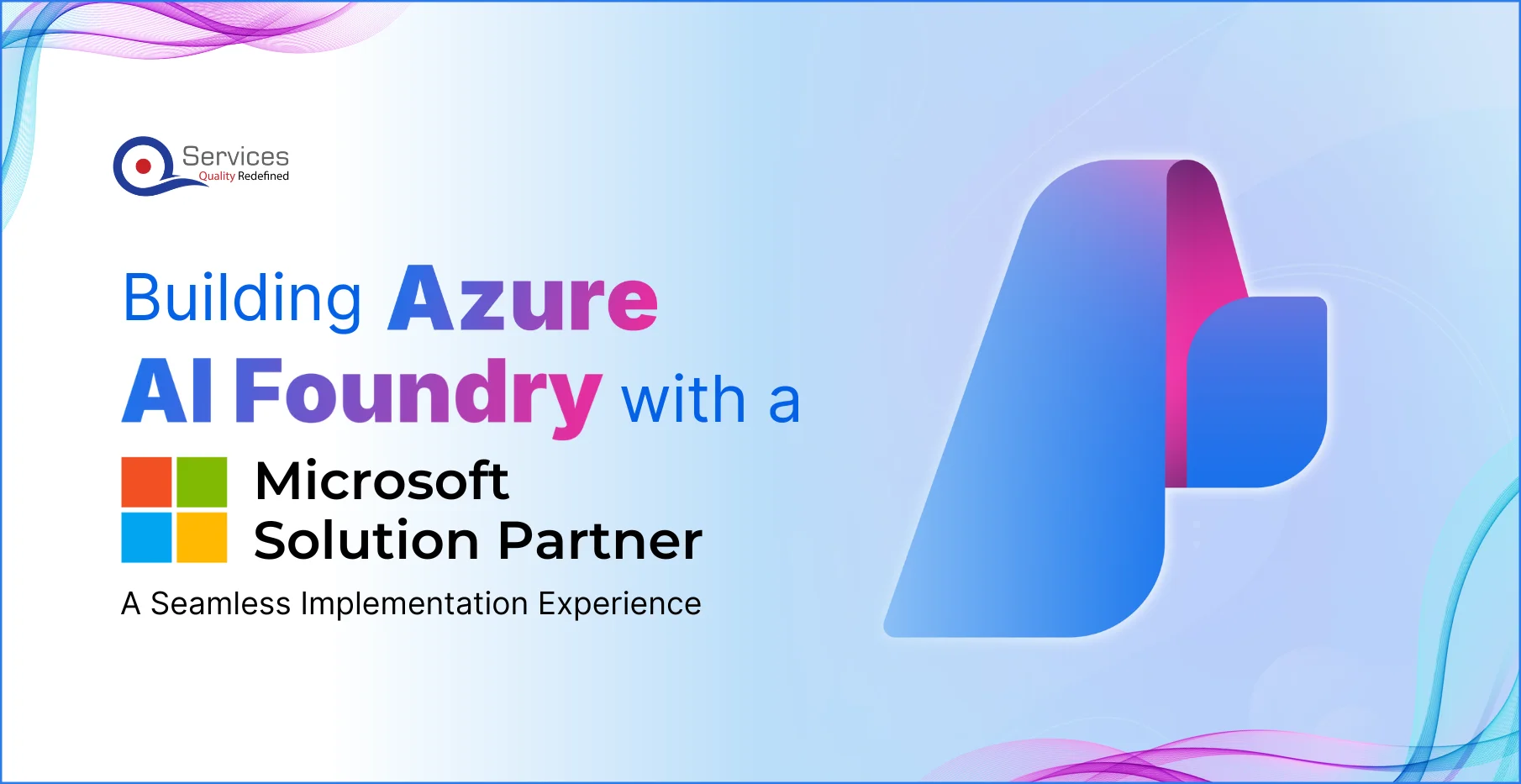
Rewards
.





CANADA
55 Village Center Place, Suite 307 Bldg 4287,
Mississauga ON L4Z 1V9, Canada
Certified Members:
.



Home » 9 Frequent Challenges in Supply Chain Management with AI

Why do supply chains often struggle with inefficiencies and delays?” This common problem is one that AI aims to solve. AI has significant potential to transform supply chain management. However, despite many benefits, there are notable challenges in using artificial intelligence in supply chain management.
In this blog, we will explore nine challenges businesses face when implementing AI in their supply chains, examining the impact these challenges can have on overall supply chain performance, and offering insights on how to overcome them.
AI in supply chain management uses advanced technologies to enhance various functions. Examples include inventory management, where AI predicts demand and automates restocking; demand forecasting, which uses predictive analytics to anticipate customer needs; and supply chain optimization, improving route planning and delivery schedules. AI is transforming how companies manage operational efficiency, risk, and supplier relationships.
AI improves supply chains through process automation and a decrease in manual labor. By enhancing efficiency through the use of real-time data and predictive analytics, it assists organizations in making better decisions.
Machine learning helps with inventory management and demand forecasting, ensuring that supply and demand are exactly matched. These AI-driven improvements help businesses tackle common supply chain issues, making them more resilient and efficient.
There are nine common challenges of ai in supply chains:
AI model needs accurate data to work well. Data fragmentation is one of the major challenges in supply chain management, where data is scattered across different systems and formats. This includes legacy systems, ERP systems, sensors, and Internet of Thing (IoT) devices, all using different data structures. Integrating these diverse sources can be tough, leading to incomplete or inconsistent data.
When data quality is poor, it’s hard to get a real-time view of the supply chain, resulting in unreliable predictions and bad decisions. For instance, inaccurate data can mess up demand forecasts, inventory management, and shipment schedules, hurting overall performance.
To make the most of AI in supply chains, it’s crucial to tackle these data issues. Prioritizing data integration and standardization ensures AI models are trained on accurate, consistent data, unlocking AI’s full potential to boost efficiency, optimize operations, and support smart decision-making.
AI implementation challenges in supply chain management often stem from lack of skilled professional, which is also considered as a major challenge in both AI and supply chain operations. Developing and deploying AI solutions requires cross-functional expertise, including data scientists, machine learning engineers, and supply chain managers. This talent gap is a significant supply chain management challenge, as it hinders the effective integration and utilization of AI technologies.
Supply chains are complex and global, involving many stakeholders, regions, and processes. This makes it tough to implement AI effectively. AI needs to handle lots of dynamic data and adapt to real-time changes, which requires a strong infrastructure and smooth coordination across the supply chain.
Challenges of AI in the supply chain arise when trying to scale AI solutions to handle vast amounts of dynamic data and real-time changes. As supply chains grow, AI systems must process larger datasets and more complex operations. This demands advanced algorithms and significant computational power, which can be costly. Keeping AI systems efficient and accurate at scale is crucial for maintaining supply chain performance and reliability.
One of the common AI implementation challenges in supply chain management is resistance to change and a lack of trust in AI-driven decisions. People often feel skeptical about relying on AI, fearing it might make mistakes or replace human jobs. To overcome this, it’s crucial to make AI models interpretable and transparent, helping stakeholders understand and trust automated decision-making processes.
Many organizations are entrenched in older, legacy systems that weren’t designed to work with AI. Integrating AI and supply chain management tools into these existing technology stacks can cause friction and is often a costly and time-consuming process. This is one of the significant challenges for supply chain management, as it requires substantial investment in both time and resources to ensure seamless integration and functionality.
While AI in supply chain management promises significant return on investment the upfront costs for software, infrastructure, and training are high. This is one of the key disadvantages of AI in supply chain management, as companies often struggle with balancing these short-term costs against the long-term benefits. The high initial investment can be a major barrier, especially for smaller businesses, making it challenging to justify and sustain AI initiatives.
One of the big challenges in AI for supply chain management is keeping sensitive data secure, especially when using third-party systems or cloud services. Suppose a company uses a cloud-based AI tool to manage inventory, they need to ensure that customer data is protected from breaches, ensuring everything remains safe and secure throughout the supply chain.
When companies focus too much on quick wins and short-term gains with AI projects, they often miss out on the bigger, long-term benefits. This can lead to AI initiatives that aren’t fully thought through and end up falling short of their potential. Without a solid, long-term plan, these projects might struggle to be sustainable or scalable, wasting time and resources. The challenges with AI often arise when there’s no clear vision for the future. To really make AI work, businesses need to invest in a well-rounded strategy that aligns with their long-term goals and growth.
As AI evolves, AI and supply chain management systems face challenges in adapting to new regulations and standards. Compliance with data protection laws like GDPR and addressing ethical concerns can complicate implementation. To successfully integrate AI and supply chain management, organizations must stay updated on regulations and prioritize transparency and ethical practices to ensure compliance and trustworthiness.
Get free Consultation and let us know your project idea to turn into an amazing digital product.
Implementing AI in supply chain management offers incredible potential to optimize supply chain operations. But for AI to truly deliver on its promise, businesses must navigate several key challenges. Here we outline these challenges and share some practices to overcome them.
AI adoption isn’t just about adding technology—it’s about having a solid plan in place. A successful AI strategy should tackle both technical and organizational challenges. Here’s what to focus on:
AI thrives on data. But in a typical supply chain, data is often scattered across old systems, IoT devices, and ERP platforms. To get the best results, you need to ensure all these data sources work together smoothly and consistently.
There’s a major skills gap when it comes to AI in the supply chain. It’s vital to hire experts who understand both AI and supply chain management. Plus, offering training for your existing team will help build internal expertise over time.
Introducing AI means a shift in how things are done. You’ll need a clear plan to help your teams embrace this change, address any concerns, and get buy-in from everyone involved.
One of the most common obstacles to AI adoption is integrating it with existing infrastructure, especially legacy systems that weren’t built with AI in mind. Here’s how to streamline the process:
By using APIs or middleware, AI can interact with existing systems without completely replace them, making the integration faster and less disruptive.
Cloud platforms offer flexibility, making it easier to deploy AI solutions without overhauling your entire system. Plus, they support scaling as your needs grow.
Instead of trying to implement AI across the whole supply chain at once, start small. Focus on high-impact areas like demand forecasting or inventory management and build from there.
A huge challenge is the shortage of skilled professionals who can combine AI expertise with supply chain know-how. To tackle this:
Many businesses face skepticism when it comes to trusting AI-driven decisions. Overcoming this trust gap is key.
Businesses can use AI models that explain their decision-making processes. In this way, they can understand how and why AI makes certain choices.
Keep detailed records of AI model development, data sources, and algorithms. Transparency in these areas helps stakeholders trust the process.
Regularly track AI performance and adjust as needed to ensure it stays aligned with business goals and regulatory standards.
Data security is essential when integrating AI, especially when handling sensitive customer or operational information. Here’s how to keep your data safe:
Encrypt confidential data both during transmission and while stored to prevent unauthorized access.
Establish secure methods for sharing data with third parties (vendors, suppliers, etc.) and ensure these exchanges comply with privacy regulations.
Limit access to sensitive data based on roles within your organization. This ensures only the right people can access and modify critical information.
Keep track of where your data comes from and how it’s used. This not only ensures security but also helps meet data protection regulations.

It’s important to remember that while the road to AI adoption might have some bumps, the payoff in the long run is huge. Improved efficiency, smarter decision-making, and better overall operations are just some of the rewards waiting for companies that take the time to do it right. So, even though AI in supply chain management might seem tough at first, the long-term benefits far outweigh the challenges, making it well worth the investment.

Our Articles are a precise collection of research and work done throughout our projects as well as our expert Foresight for the upcoming Changes in the IT Industry. We are a premier software and mobile application development firm, catering specifically to small and medium-sized businesses (SMBs). As a Microsoft Certified company, we offer a suite of services encompassing Software and Mobile Application Development, Microsoft Azure, Dynamics 365 CRM, and Microsoft PowerAutomate. Our team, comprising 90 skilled professionals, is dedicated to driving digital and app innovation, ensuring our clients receive top-tier, tailor-made solutions that align with their unique business needs.
![Microsoft AI Implementation Costs Exact Pricing & ROI Calculator for Enterprise [2025]](https://www.qservicesit.com/wp-content/uploads/2025/03/Microsoft-AI-Implementation-Costs-Exact-Pricing-ROI-Calculator-for-Enterprise-2025-.webp)
Companies are using Microsoft AI implementation to improve work processes, automate tasks, and make better decisions. But before starting with AI, businesses must understand the costs, pricing models, and potential return on investment (ROI) to make smart financial choices.

Microsoft Cloud for Healthcare helps medical organizations move to the healthcare cloud, making their work faster, safer, and more reliable. But moving to the cloud isn’t as simple as flipping a switch.

Azure AI Foundry was previously called Azure AI Studio. This change is a big improvement, making it a stronger and easier tool for developers and businesses. Whether you’re building a generative AI model or crafting a solution for predictive analytics, Azure AI Foundry ensures that every stage is handled efficiently — and with seamless integration into the broader Microsoft Azure ecosystem.
The main challenges include poor data quality, difficulty integrating AI with existing systems, high upfront costs, and the need for ongoing employee training.
AI helps by optimizing inventory, improving demand forecasts, streamlining logistics, and making smarter decisions in real time.
Good data is key! Without accurate, clean data, AI can’t make reliable predictions, leading to poor decisions and inefficiencies.
Companies use tools like APIs or cloud-based platforms to connect AI to their current systems, making it easier to adopt without major overhauls.
Costs include software, hardware, staff training, and maintenance. While initial investments are high, the long-term savings and improvements make it worthwhile.
AI analyzes past data and factors like market trends or weather, helping companies predict demand more accurately and avoid overstocking or stockouts.
Concerns include data privacy, potential bias in AI decisions, and the risk of job losses due to automation. Companies need to address these with transparency and fairness.
Risks include over-dependence on technology, potential data breaches, and AI errors. Companies need a balance of AI and human oversight.
AI analyzes equipment data to predict failures before they happen, reducing downtime and maintenance costs.
Ongoing training, hands-on learning, and partnerships with AI experts can help staff get up to speed on how to use AI in supply chain roles.
AI provides real-time tracking and analytics, giving businesses a clearer picture of operations and helping them make faster, better decisions.
Scaling AI can be tough because of the large data volumes, compatibility with different systems, and maintaining performance across regions.
.





55 Village Center Place, Suite 307 Bldg 4287,
Mississauga ON L4Z 1V9, Canada
.




Founder and CEO

Chief Sales Officer

🎉 Thank you for your feedback! We appreciate it. 🙌